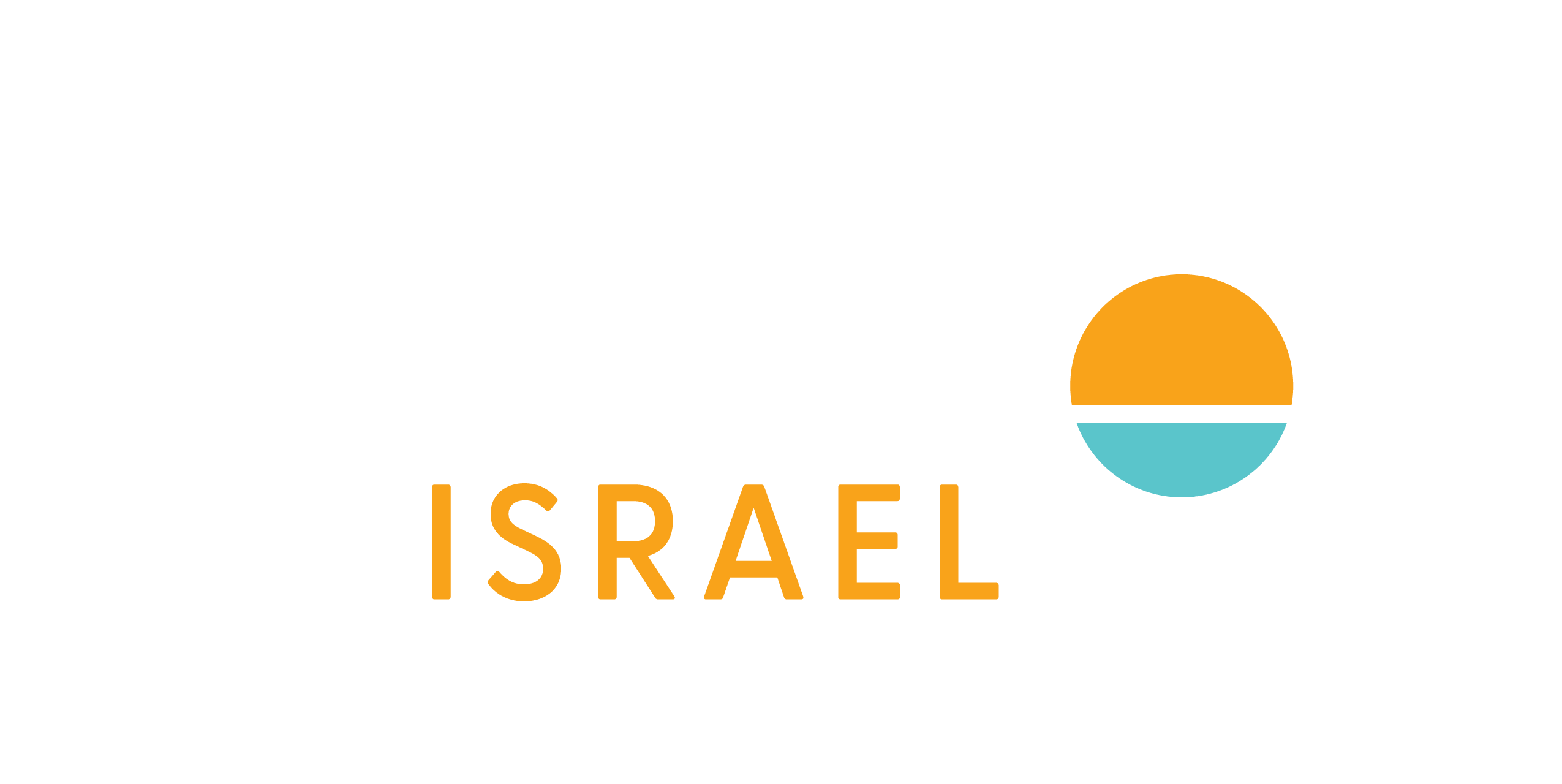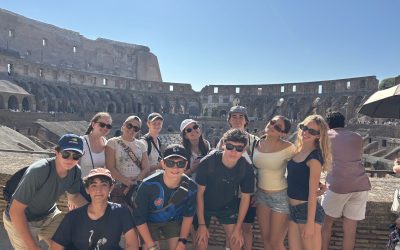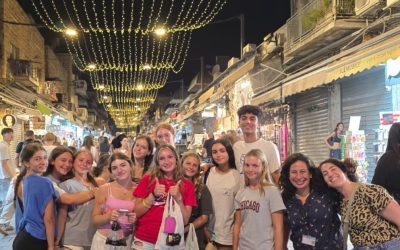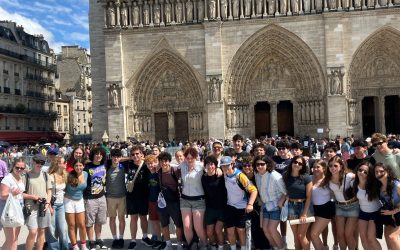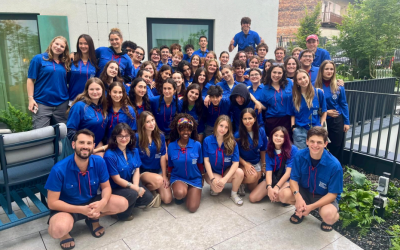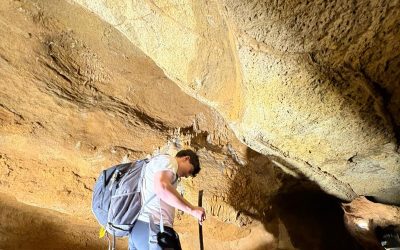By Rabbi David Wilfond, Director of Education
On Sunday, the teens hiked with LOTEM, an organization that makes nature accessible for children and adults with special needs. LOTEM is the leading organization is Israel that offers accessible hikes and activities in nature for people with disabilities in Israel. At lunch time the group travelled to Muna’s Kitchen, a home in the Druze village Dalyat El Carmel for an authentic lunch and a chance to learn about the Druze community; their faith, their customs; and their place in the mosaic of Israeli society. Muna’s husband was the first Druze kibbutz member, as a member of Sde Boker. Next the teens built windchimes with their Hebrew names at the Maarag Center, a non-profit organization and café that host workshops and provides employment for people with special needs, and helps them to create art products in an accepting and immersive community. At the end of the day the group explored one of Israel’s most famous National Parks, The Rosh HaNikra Grottoes. This features the country’s steepest cable car descent bringing visitors down to the Mediterranean Sea past sheer gleaming white cliffs. At Sea Level the teens follow a trail that winds in and out of the picturesque grottoes filled with rushing water, crashing waves and the salty spray from the nearby Mediterranean Sea.
Monday, the group ascended to the ancient mountain top town of Tzfat. This town was home to Jewish Kabbalah-mystics who revolutionized Jewish Spirituality in the 1500’s, creating the Kabbalists’ Shabbat Service (known as “Kabbalat Shabbat”.) This religious innovation from Tzfat, is observed in every virtually Reform Synagogue today!) Here, the Kabbalists also composed the most famous of all Shabbat Songs, “Lecha Dodi.” The phrase “Tikkun Olam” was also first created here by the Kabbalists of Tzfat as a belief that one’s deeds on earth have ethical implications for the entirety of the cosmos. In Tzfat the teens engaged in a workshop organized by the Livnot v’Llihibanot organization. They had a powerful and inspiring experience connecting with elderly Israelis at Livnot v’Lihibanot, continuing to meet the many faces and communities that make up Israel. This workshop helped the students connect practically with Kabbalistic inspiration as they engaged in physical projects of Tikkun Olam. In the late afternoon the teens volunteered in the community garden of Maalot a picturesque town high in Israel’s Galilee Mountains.
Tuesday, the group visited the Yemin Orde Youth Village that serves as home for of Russian and Ethiopian immigrants who are come from underprivileged backgrounds. Our teens clear pines to prevent wildfires and harvested vegetable in the garden, contributing to the powerful work of Yemin Orde. At lunch, they sat with some of the teens at Yemin Orde, sharing stories and connecting over their common bond of being teenagers. Aaron Taylor, a member of the Reform Movement, and a local expert on minority groups, ethnicity and religions then led a conversation about the map of Israel, specifically focusing on the experience of those living in different territories or as minorities in Israel. Our group followed that discussion with a walking tour through Wadi Nisnas a neighborhood of Haifa that is home to both Arabs and Jews, and is a much-admired model of co-existence. To chill-out at the end of the day, the teens took in the Haifa Bahai Gardens, a botanical extravaganza famous throughout the world.
Yesterday, we began with a visit to the Galilee Medical Center which treats Syrian victims wounded in the bloody civil war, just over the border. This story of humanitarian assistance by Israel is very inspiring and little known outside of Israel. The teens toured the facility and got to meet a medical clown who works to bring joy at some of the toughest times. The teens then went to volunteer at Q School a preschool program that teaches English to Arab students. This kindergarten is run by Dr. Dalia Fadilma the first female Dean of an Islamic college in Israel. She promotes peace and co-existence through positive, affirmative and self-powering education. Connecting and playing with the kids was a highlight for many, with smiles and laughter coming from everyone.
In the afternoon, the group made its way south to Jerusalem and stopped by the Knesset Menorah for an “Arrival Ceremony” in Jerusalem. While visiting the Kneset Parliament Building, the teens learned about Israel’s government system and the role of parliament and democracy in Israel to advance social justice issues in Israeli Society. After their visit to the Kneset many said, “We didn’t imagine a tour of a government building could be so interesting.” Following their visit to the Kenset, the group had a much greater understanding of the make up and structure of the Israeli government and how it contributes to social justice efforts in Israel.
As the United States celebrated July 4th this week, it seems appropriate to share a bit about the meaning of July 4th for Israelis. It was on this day in 1976 that Israel sent a commando mission to Entebbe, Uganda to rescue over 100 Jews being held hostage by terrorist hijackers. July 4th is powerful date for Jews. On July 4, 1946 a year after the end of WWII, 42 Jewish survivors of the Holocaust were brutally murdered in Kielce, Poland by their Polish neighbors because they, the Jews, had dared to come back to live again in their homes in Poland. In 1946 Jewish life was cheap and one could murder Jews freely without protest, as tragically occurred to the Jews in Kielce. Exactly 30 years later to the day, 102 Jewish hostages of a combined German and Palestinian Terrorist Cell were in danger of being murdered in Entebbe. One of the big differences between 1946 and 1976 was the existence of the State of Israel and the IDF. Israel does not exist just to protect Israelis. Israel sees as its mission to protect Jews anywhere they are in danger. This is why Israel has done so much over the years to rescue Ethiopian Jews and Russian Jews. In 1976 over a hundred Jews were in mortal danger in Uganda, so what did Israel do? They sent their soldiers in the dark of night on daring rescue mission 2,500 miles away and brought the hostages back to safety in Israel. In 1976 Jews around the world felt safer than Jews just thirty years before in Poland. The difference is that in 1976 the State of Israel had already come into existence. Israel looks out for the safety of Jews where ever they live. This is a powerful message of Jewish responsibility that has become a big part of July 4th memories in Israel.
